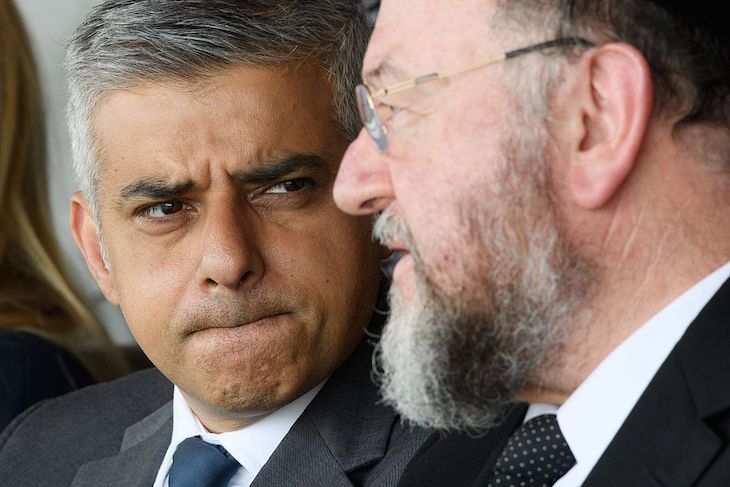A while back, Lee Anderson got himself into trouble for claiming Islamists had ‘got control’ of Sadiq Khan. Levelling said charge at London’s Mayor was said to be ‘Islamophobic’ but surely more important is that it was wrong. Khan is neither an Islamist nor under their sway. He is a standard-issue identity-politics progressive, and with that comes a toxic farrago of communalism, victimhood narratives and offence opportunism. It is Khan’s identity-politics progressivism that was on display when he implied that comments by Sir Ephraim Mirvis were motivated by anti-Muslim prejudice.
In the space of just 130 words, Khan manages to find offence and wallow in imagined victimhood
The row originates in a tweet posted by Sir Ephraim on Halloween 2023 following a meeting with Khan, prior to which Khan had demanded a ceasefire in Israel’s military operation against Hamas. Sir Ephraim wrote:
‘This afternoon at City Hall, I thanked Sadiq Khan for his ongoing, unequivocal commitment to fighting antisemitism across London and I also explained to him why I believe that a ceasefire now would be an irresponsible stepping stone to yet more Hamas terrorist brutality.’
If you can’t see what is so objectionable about that, understand that you have to want to see it. And Khan apparently wanted to see it. During an interview with Mehdi Hasan posted on YouTube on Thursday, Khan was asked how he felt about ‘criticism from prominent Jewish people’. He said:
‘I am actually disappointed by some of the response from Jewish leaders and Jewish friends and here is an interesting observation that somebody told me about which I wasn’t aware of. Very shortly after I called for a ceasefire, the mayor of Greater Manchester called for a ceasefire. I’ve not seen the Chief Rabbi [or] the Jewish Chronicle say comments said against me in relation to my calls for a ceasefire and I’d ask those Jewish people: just pause and reflect on their response to me calling for a ceasefire. What motivated them to come back in the way they did against the mayor of London and the mayor of Greater Manchester? I’ll give you a clue — he’s not called Ahmed Burani, he’s called Andy Burnham whereas I’m called Sadiq Khan.’
And there you have it. In the space of just 130 words, Khan manages to find offence, wallow in imagined victimhood and engage in communalist politics. He is an importer of the kind of progressive sectarianism that once loomed on the margins of the American left but is now the bread and butter of the Democrat party. London, a city of minorities, is an ideal testing ground for an ideological worldview that pushes identity-based division in the sweet-sounding language of ‘diversity’ and ‘inclusion’.
In point of fact, Khan and Burnham called for a ceasefire on the same day: 27 October. The Chief Rabbi did not issue a statement in response to either. He held a meeting with Khan on 31 October and tweeted about the issues they discussed afterwards, which included Sir Ephraim’s case against calling for a halt to hostilities while Hamas remained in a position of strength and continued to hold Israeli hostages. He did not meet with Burnham until a full month later, on November 30, by which point a humanitarian pause was in place. That is why the tweets posted by Sir Ephraim after the two meetings were not worded identically, but someone of Khan’s political inclination cannot pass up an opportunity to take offence. In grievance, self-pity and confected oppression, there is much power.
Khan has apologised for his remarks
What is so contemptible about throwing Sir Ephraim to the wolves is that he is a mild-mannered clergyman. Chief rabbis tend to define the role according to their own personalities and interests. Immanuel Jakobovits, of blessed memory, was a great moral polemicist, an ally to Margaret Thatcher and thorn in the side of the liberal establishment. Jonathan Sacks, of blessed memory, was an intellectual who thought and wrote deeply about Judaism, philosophy and the ethical life.
Sir Ephraim is softer spoken, jollier in tone, a doing rabbi rather than a musing one, pouring his energies into strengthening cooperation between faiths, promoting Jewish education, and giving British Jews both spiritual sustenance and a voice with which to speak to power and officialdom. He is not a politician and it is lamentable to see this deeply religious man, who beams with enthusiasm in his weekly videos exploring the latest Torah portion, being exploited for base political purposes by a base political chancer.
Khan has apologised for his remarks, and well he might for they play into a hotbed of hostilities already aflame and in no need of more accelerant from the Mayor of London. Allow me to end with a prediction: the representatives of British Jews will respond to Khan’s apology with forgiveness and graciousness. We will once again hear about how Khan is a friend of London’s Jews, a reputation that seems to originate as much with Jewish representatives as it does with the mayor’s personal conduct. Despite the many temptations to play the game of demographic division, what is striking about the best Jewish communal organisations is the extent to which they manage to resist the worst of communalism. They appear more concerned with social harmony than with group advantage, understanding their distinctions to be part of the British story, rather than the building blocks for dividing walls separating their community from the rest of society.
I appreciate that I am leaving myself open to accusations of romanticising British Jews as that most unfashionable of things, the model minority, but so be it. Given a choice between how Sadiq Khan approaches the tensions of multiculturalism and how Sir Ephraim Mirvis approaches them, I am in no doubt as to which approach is better.







Comments